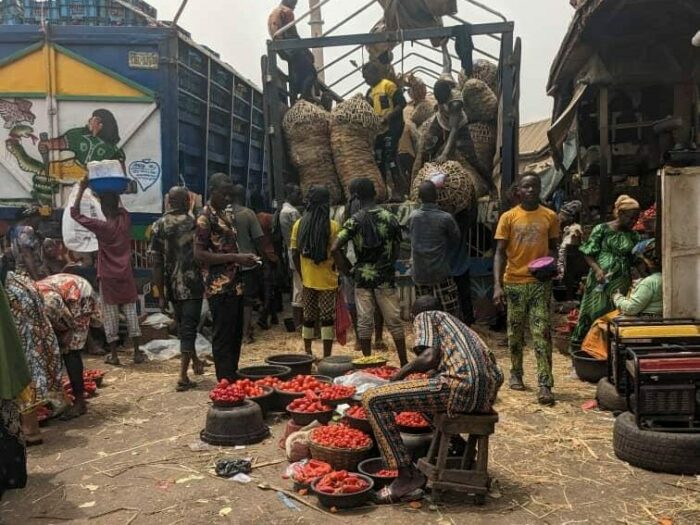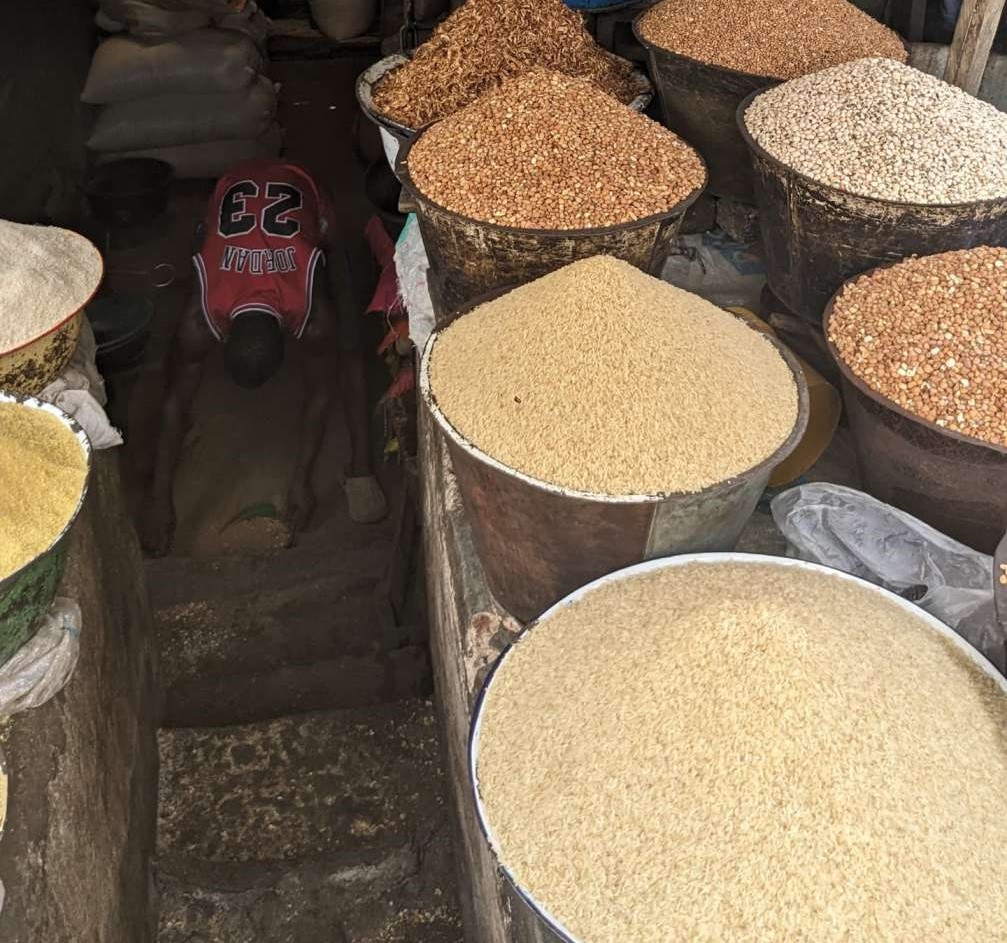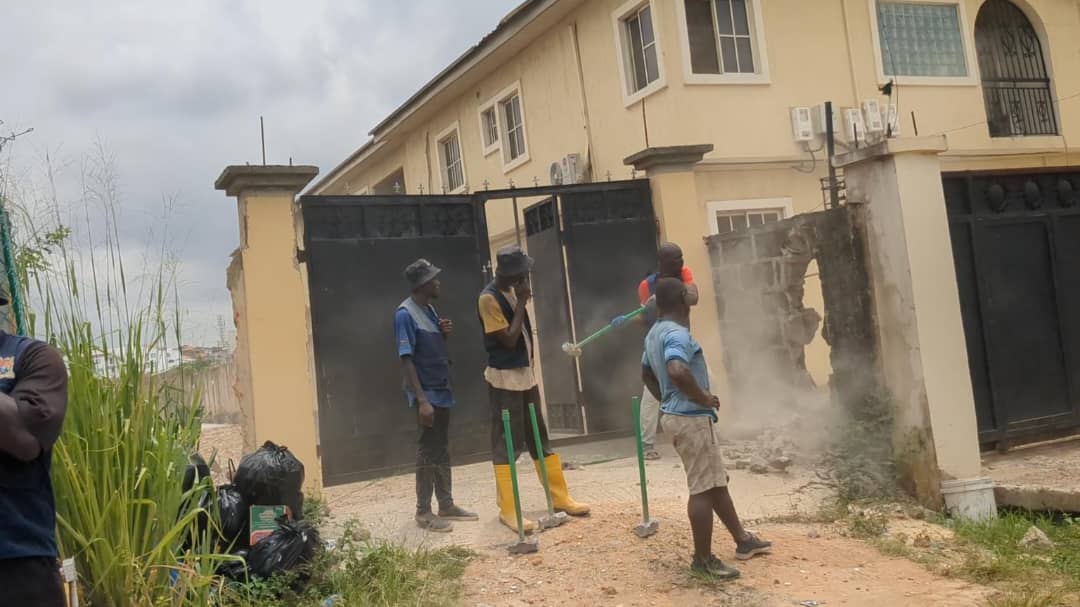The Lagos Mile 12 International Market is renowned as the home of perishable foodstuff. One of the signposts welcoming traders and buyers into the large area reads “Welcome to Mile 12, Home of Quality and Affordable Foodstuff”.
The large market is located in southwestern Nigeria but attracts traders and merchants from neighboring West African countries.
Lagos is busy, but the unusual millage of people at the food market would make anyone curious. From across the expressway, young Hausa men displaying their wares in their hands is a common sight.
They display tomatoes, onions, and pepper that they constantly push into the faces of commuters stuck in traffic, and even tubers of yam. These traders suffice for those who can’t afford to browse through the busyness of the market, but for someone who wants to understand how the market earned its reputation, their section is just the beginning of an adventure.
The market is ever bustling with food trucks and people who arrive almost every minute to transact. At the rear of the transporter bridge that arched its length above the market, I met Bature Alli, a pepper trader, who shared a tiny space with his friend who sold onions on a strip of land facing the Ikorodu expressway.
Bature was cheerful when I met him. He was enjoying a breakfast of bread and soda. He smiled as he munched his meal. The obvious absence of customers didn’t deter him, and his hopeful smile didn’t dim when I asked, “You dey accept transfer?”
Even though Bature responded with a smile, his friend didn’t find it amusing. He burst into a string of his dialect which did no justice to conceal his anger. Bature was, however, kind enough to interpret the triggered outburst my request had elicited from his friend.
“My friend is angry because everyone who has stopped here to patronise him only offered transfers, whereas, he doesn’t get it the same way when he goes to buy his goods. The people he buys from won’t accept anything aside from cash, even though it is in the same market,” he said.
He offered to take me to a place where I could withdraw N10,000 for N12,000 if I was in dire need of cash.
His litany didn’t stop. “All the people selling foodstuff don’t have accounts. They are farmers from the far north, who have no access to banks or accounts. The only way to pay for their produce is cash, because their products are perishable.
“Beyond the farmers, the policy has caused severe hunger among the masses. People can no longer afford to buy meals despite having money in their accounts. Getting a PoS agent that has money is increasingly difficult.
“Patronage has also reduced. People come to the market to beg to buy food because they can’t access their money.
“Last week, someone came to give me his goods worth N3,000. He begged me to sell them for him, just so he could have cash.”
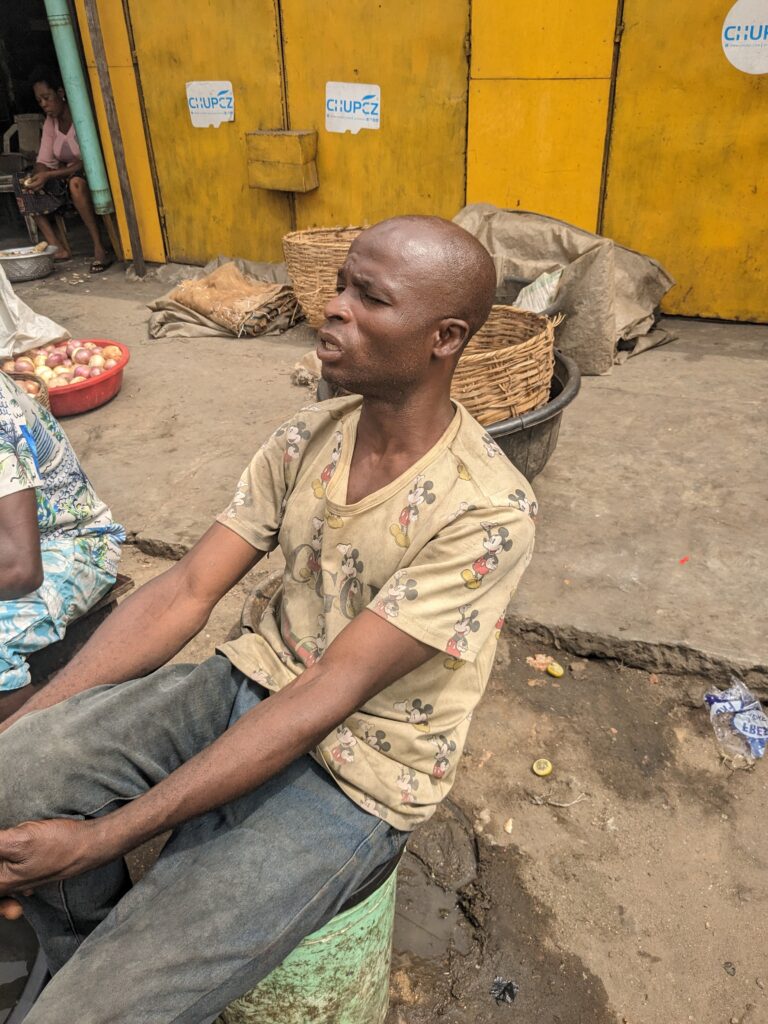
The Kaduna-born businessman said the unavailability of the naira notes led to the civil unrest that happened the week before.
“The people at Mile 12 garage were pushed to stage a protest due to the unavailability of the new notes. There had been a protest in other parts of the country, and they wanted to replicate it to show their hunger.
“They set bonfires and placed barricades on the road from Mile 12 to Berger but they were quickly disbanded when soldiers arrived.”
ELECTIONS
Bature stated that although he was drained by the current state of the nation, he wouldn’t be discouraged to exercise his civic duty, and that even if he was offered money to vote for a particular candidate, he would only vote the person he believed in.
“If anyone vying for office approaches me with money to vote for him, I will take it but vote for who I think can do the job. It is a secret ballot and no one can pry to know whom I am voting,” he said with a wide grin on his face.
He readjusted his posture on the dirt-stained green plastic container he sat on and hugged his knees.
“Anything the politician offers, I will take. I won’t even give him a price. I will tell him I like him and also accept the gift as my luck. The person must have stolen money from the government for such lavishness,” said Bature.
“If God give am luck to enter, that is his fault. If e no give am luck, na im problem be dat.”
An elderly woman who sold vegetables in the market said she would jump at the chance to exercise her civic right because she hoped to change things with her vote.
“The cash scarcity is more terrible than we think. People rarely come to the market because they can’t afford to,” she said as she rolled some leaves into a bundle.
“I will go out to vote so we can have the Nigeria of our dreams. Today, those who can afford to would offer to pay with a transfer, but it is not sustainable for me.
“Everything I have here (she waved her hands over the different vegetables laid in piles on a wet white polythene bag) is not more than N3000. If they don’t have cash, they can go. It is whatever I have that I will also take to the market the next time I’m going.”
FOOD INFLATION
A few steps away from Bature, I met Muritala Ahmed, who was in the same trade.
Ahmed told me that he didn’t accept transfers and would only sell to anyone who was willing to pay him in cash.
“I no get account,” he said.
“One downside to the scarcity is that people no longer come to the market as usual. Even those that come pay with fake notes; everyone is just trying to be careful.”
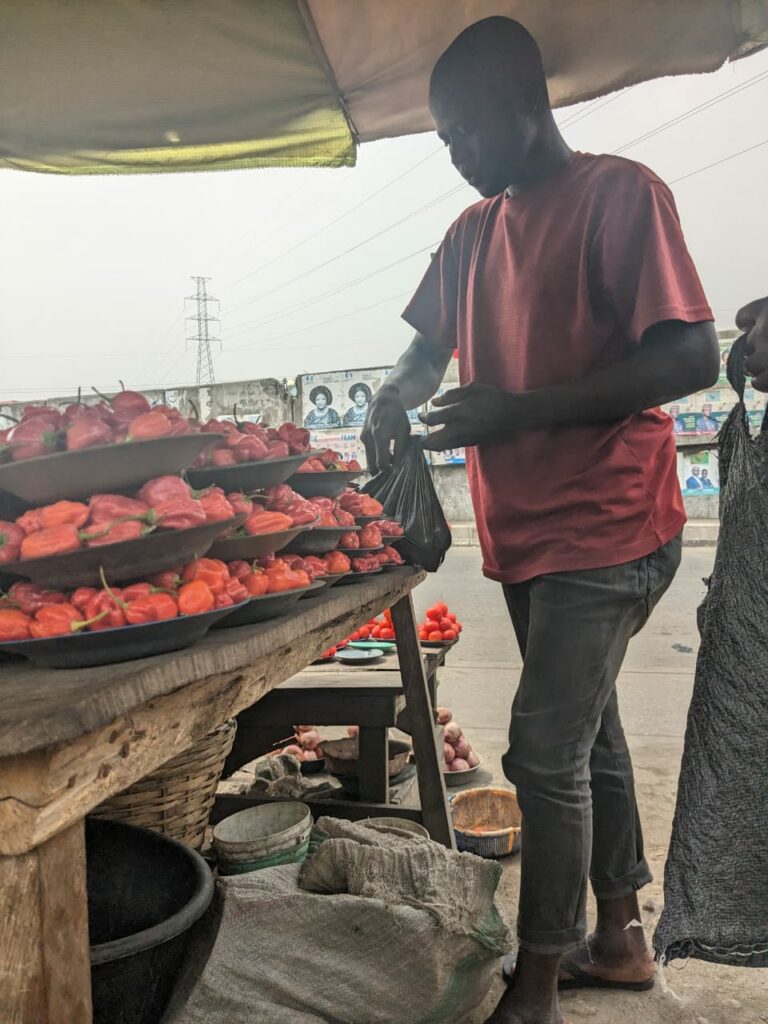
Ahmed said the cash crunch had caused a hike in the prices of food, as the costs were nearly doubling.
“The recent price of foodstuff is another reason people are staying away from the market. The usual basket of tomatoes, which went for between N8,000 and N10,000, now goes for N13,000 to N18,000, same with pepper sold at N4,000. During this cash scarcity, its price has risen to N10,000.”
Rilwan, whose makeshift shop also faced the expressway, worried that the rising cost of food might be a bigger problem than the unavailability of cash.
“A derica of long-grain rice sells for N700, while the short-grain is N600. The Nigerian rice, which used to be cheaper, is no longer available. A derica of beans now sells for between N400 and N600,” he told FIJ.
READ ALSO: REPORTER’S DIARY: In Osun, Old Naira Notes Are As Useless As a Glass Hammer
“Food is now more expensive than we think.”
According to Trading Economics, the percentage inflation of the cost of food moved from 23.75% in December 2022 to 24.32% by the first month of 2023.
‘OLD NOTES’
On February 16, in a TV broadcast, Muhammadu Buhari, the President of Nigeria, announced that N1000 and N500 notes previously used as legal tender in the country were no longer acceptable.
He stated that only N200 notes would still be redeemable at commercial banks.
Godwin Emefiele, the Governor of the Central Bank of Nigeria (CBN), had stated that the old notes were to be taken only to the CBN where they would be converted.
The announcement has caused a nationwide frenzy and further plummeted the long queues at the apex and commercial banks.
So, it was natural for my ears to be instinctively drawn to the “old notes, old notes” chant they heard after I left Rilwan and walked further.
A few steps back and what I heard was confirmed. There were traders willing to accept the old N1000 and N500 notes if you would patronise them.
A middle-aged who spoke Yoruba bent over the colorful slippers she sold and said if I had the old notes, I could buy anything.
“But how do you redeem these old notes considering the queues and the procedure required?” I asked curiously.
“We take them to Owode-Idiroko border where they are swapped with the new notes,” she said.
“Why not the CBN?”
“If you don’t want to buy, just move away,” she said as she resumed her “old notes, old notes” chant.
A few steps away from her, I found an elderly woman who had the same slippers the other woman sold and the same chant. She spread the slippers out on a black polythene bag in front of her.
“Old notes?” I feigned curiosity.
“Yes, you can buy with the old notes if you have them,” she answered.
“But how do you discard them?” I asked her too. Rather than answer, she shooed me away and bent to straighten her goods.
Further down, I met Mummy Shukura, who told me I would find a point of sales (POS) centre somewhere deep in the market that would accept my old notes if I had any.
“For me, I use whatever old notes I accept to buy goods again. That way, I can get them off my hands,” she said.
READ ALSO: REPORTER’S DIARY: An Evening At Rahmon Adedoyin’s Reopened Excellence Hall Hotel
WINDING PASSAGES
One spectacular thing about this international market is how long passages unwind into each other. Every section of the market intersects and opens up into another. It’s easy to be lost in the corridors that open up into the fruit, vegetable, tomato, potato, cassava, beans, and onion sections.
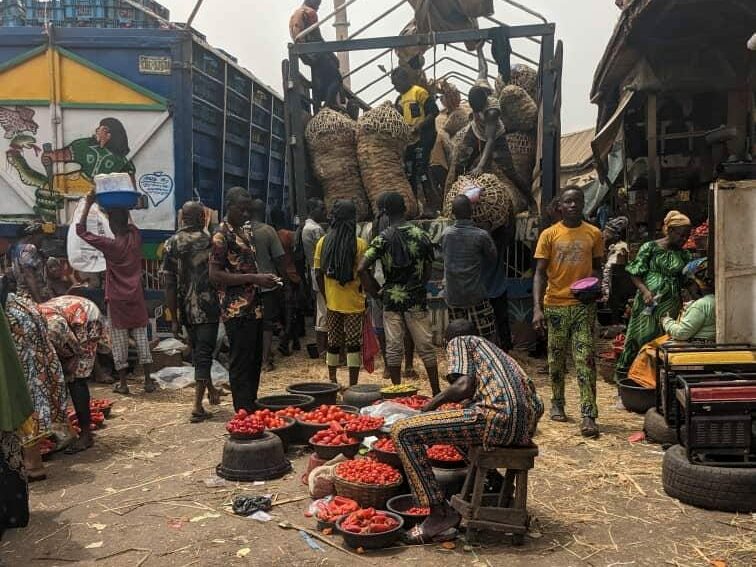
Dirt, food waste and human waste lined the walls of these corridors. They mingled with the smell of fresh produce ready to be sold.
By the time I was leaving, I marveled at the strength of market to stand tall in the midst of the cash crises because almost every minute, a new truck or person joins the Mile 12 International Market.
Subscribe
Be the first to receive special investigative reports and features in your inbox.


